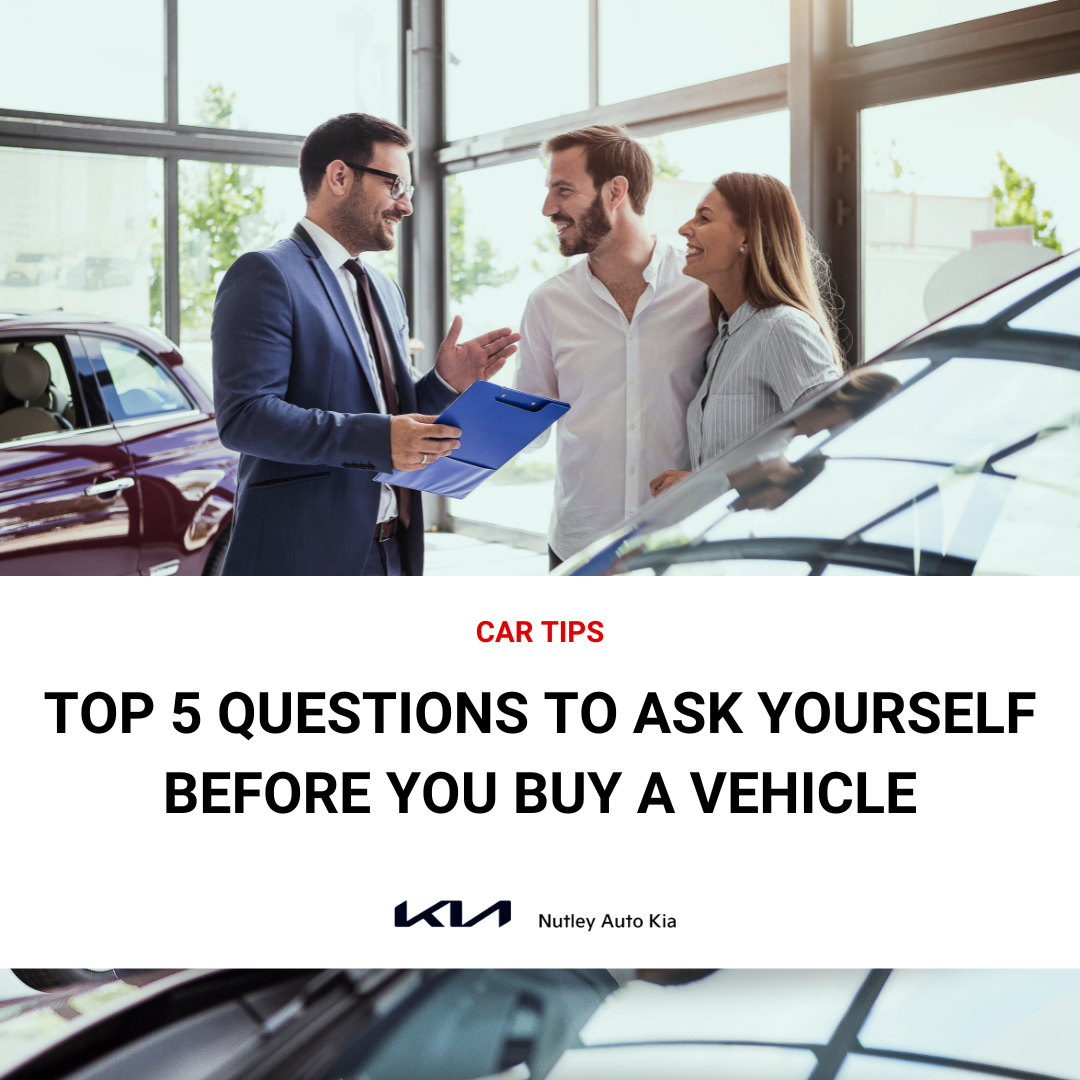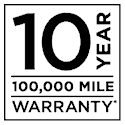

Here at Nutley Kia, one of our goals is to ensure that our customers know everything they need before buying a vehicle. So with that in mind, today we will dive into different things you should consider before purchasing a vehicle.
When beginning your vehicle search, there are many factors to consider. It would be best to determine which vehicle fits your lifestyle. What vehicle size fits your needs? Would you need a sedan or something bigger like an SUV? What vehicle features are you looking for? Is the vehicle reliable? Does it have good federal safety ratings compared to other models? Most importantly, what is the vehicle price range and monthly payment range you are looking to stay in?
5 Questions to Ask Yourself Before Buying a Vehicle
-
Will my next vehicle be hybrid, electric, or gas-only?
When buying a car, you must know the difference between hybrid, electric, and gas-only vehicles. The power sources and how they generate power can differ depending on which type of car that will be best for you.
-
Gas-Only Vehicles
Gas-only cars are known as internal combustion engine vehicles, which run on gasoline or diesel fuel. These cars use an engine to burn fuel, which creates energy that powers the vehicles and is transferred to the wheels through a transmission system. Also, the fuel economy and environmental impact are improving. However, they are sensitive to gas prices and prices are increasing due to the engine power.
-
Hybrid Vehicles
Hybrid cars use a combination of gas or diesel engines, an electric motor, and a battery pack. Depending on the driving conditions, these vehicles utilize either a machine, an electric motor, or a combination of both. Often, hybrid cars have regenerative braking systems that convert energy from braking systems into electricity to recharge batteries. Meanwhile, they offer a combination of gas and electrical power.
-
Electric Vehicles
Electric cars, known as battery electric vehicles (BEVs), run solely on electric power and have a large battery pack that powers an electric motor to turn the wheels. To power electric cars, they need to be plugged into an external power source to recharge their batteries. Moreover, they do not produce any tailpipe emissions and are deemed more environmentally friendly than gas-only and hybrid cars. Keep in mind though, price range and safety concerns require research and education.
All in all, when buying a vehicle, consider the types of cars you are looking for. Each type of vehicle has its benefits and drawbacks. Yet, the choice is yours – depending on your personal preferences, driving habits, and availability.
-
What is my price range?
It would help if you considered several factors when developing a price range during your car-buying journey. Here are some steps you can take to build and understand your price range.
-
Research Market Value
When doing your research, determine the market value by researching the make and model of the car you are interested in. There are websites online that you can use to analyze automotive market values; popular platforms include Kelley Blue Book and Autotrader. Using them lets you find the average price of the car you are looking for.
-
Determine Budget
When you are researching market value, be sure to keep your budget in mind. And when making your budget, consider your overall financial situation and how buying a car will impact your finances. By doing these things and considering various factors, you can develop a general idea of how much you want to spend during your purchase.
-
Decide if Leasing or Financing is Best For You
Once you have decided you are ready to get a vehicle, it is important for you to determine how you want to purchase this vehicle. Deciding if you are leasing or financing is very important to look at and to compare pricing for both options. Prices change depending on your credit and/or if you would be putting a down payment. It is very important to understand what your credit score is and how it can affect your monthly payments. Along with learning and knowing the risk of running your credit too often.
-
Factor in Additional Costs
Next, you are going to want to consider additional costs. Additional costs include maintenance, repairs, insurance, gasoline, and charging stations. With so many factors involved, these costs can add up quickly and subtly, so be sure to consider these things when creating your price range. Lastly, be sure to understand factory and extended warranties available to you.
-
Is this vehicle the right size and model for me?
It is important for you to make sure the vehicle fits you and your needs. You should decide what size and model car you prefer. The size and model of the vehicle you want can be impacted by lifestyle, price, the terrain you will use the car on, and more.
-
Take a Test Drive
Before committing to a vehicle, it is very important and helpful for you to go take a test drive! Test driving a vehicle helps determine if you like how the car feels and drives! Check out and test out all the features in the vehicle. Can the seats be adjusted to your liking and preference, if the truck is big enough for your needs.
-
Are safety systems included?
Asking about safety features when buying a vehicle is critical because it can make a difference in your life and your passengers. Meanwhile, having safety features can drastically reduce the risk of injury. Some safety features like anti-lock brakes, airbags, stability control, and backup cameras will be in almost all cars in 2023. With that in mind, confirming that these features are included in the vehicle you are purchasing is essential. Additionally, newer cars may also feature safety technologies like lane departure warnings, blind spot monitoring, and automatic emergency brakes in newer cars, so be sure to see if those features are included if you want them. Understanding the reliability and technology that ensures your driving safety is essential to consider when buying a car.
-
How much are vehicle maintenance costs?
Another critical question to ask and research before buying a car is how much maintenance costs. When researching maintenance costs, you can ask questions like:
- How much should I expect to spend on routine maintenance? Such as oil changes, tire rotations, or brake pad replacements?
- Are there any repairs or commonly understood issues associated with this type of vehicle?
- Are any warranties or service plans available to help save me money on maintenance?
- What is the expected lifespan of the vehicle’s major components? Like the transmission and the engine, EV battery, and what is the cost to replace them if they fail?
By asking a car dealer these questions or by researching the answers yourself, you will better understand the long-term costs associated with buying a particular car and how it fits into your budget. All of these answers can vary depending on the make and model of a vehicle. So, with that in mind, doing this research beforehand will prepare you with all of the maintenance information you need to know when buying a car
Nonetheless, these are the five questions you should ask yourself when buying a car. Here at Nutley Kia, we want to ensure you have all the information you need and more when making a massive decision like buying a car. If you want more content on car maintenance, ways to save money for your vehicle, and local events, read our blog! Thanks for reading. Check back soon!
Works Cited:
https://www.consumerreports.org/buying-a-car/questions-to-ask-before-you-buy-a-car-a6387933582/
https://www.kellycar.com/posts/blog-top-5-questions-buying-new-car



![[Facebook]](https://www.nutleykia.net/blogs/930/wp-content/plugins/bookmarkify/facebook.png)
![[Google]](https://www.nutleykia.net/blogs/930/wp-content/plugins/bookmarkify/google.png)
![[LinkedIn]](https://www.nutleykia.net/blogs/930/wp-content/plugins/bookmarkify/linkedin.png)
![[Twitter]](https://www.nutleykia.net/blogs/930/wp-content/plugins/bookmarkify/twitter.png)
![[Email]](https://www.nutleykia.net/blogs/930/wp-content/plugins/bookmarkify/email.png)



 Warranties include 10-year/100,000-mile powertrain and 5-year/60,000-mile basic. All warranties and roadside assistance are limited. See retailer for warranty details.
Warranties include 10-year/100,000-mile powertrain and 5-year/60,000-mile basic. All warranties and roadside assistance are limited. See retailer for warranty details.